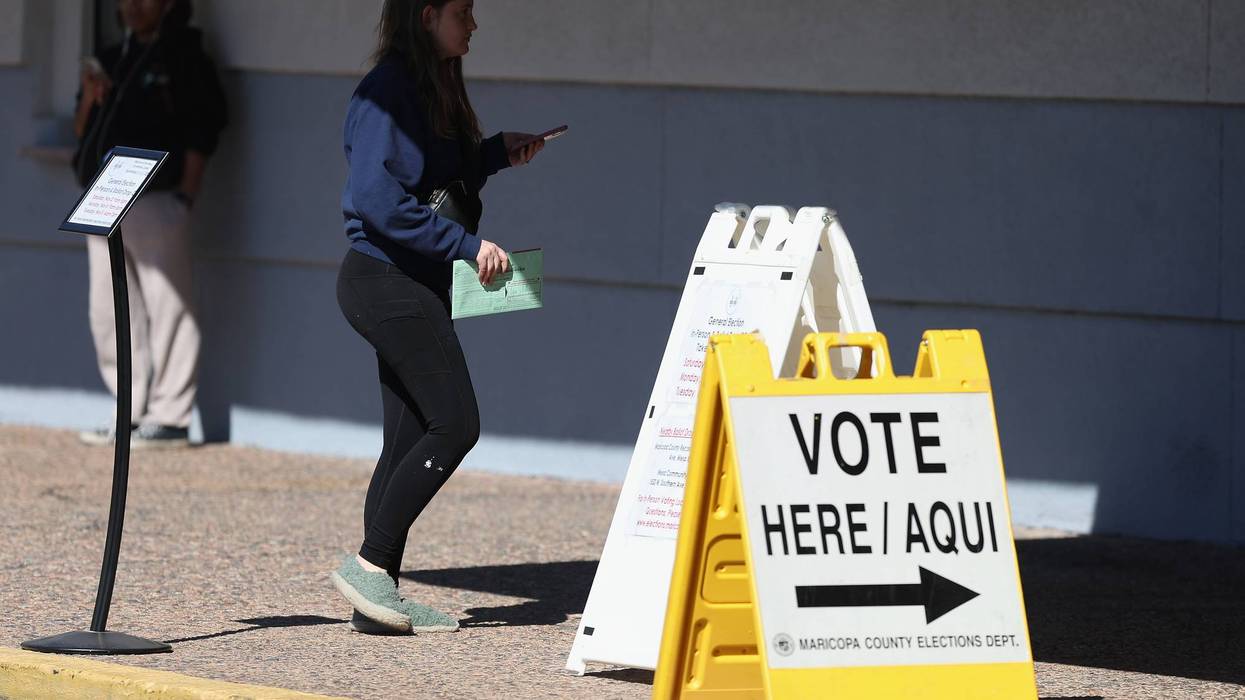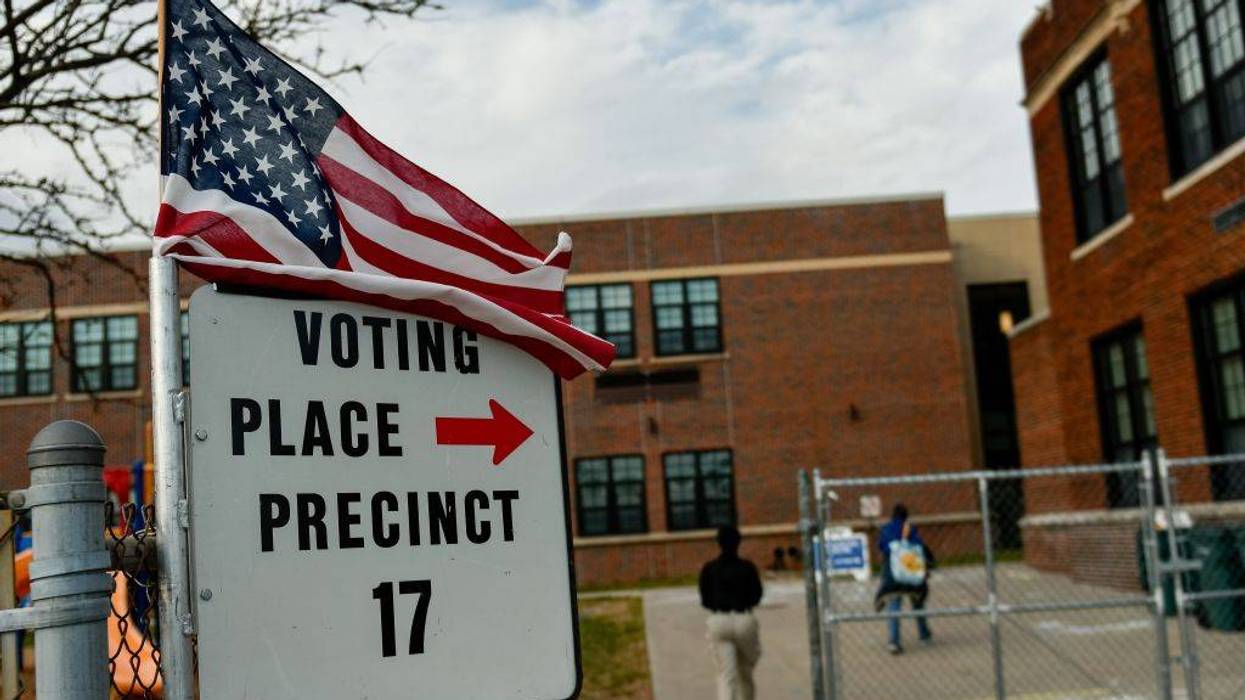Arizona GOP Pushes 'Fascist' Bill Requiring ICE at the Polls on Election Day
It comes shortly after Homeland Security Secretary Kristi Noem went to Arizona and said her agency would "make sure we have the right people voting, electing the right leaders."
As the Trump administration threatens to deploy Immigration and Customs Enforcement to menace voters on election day, Arizona Republicans are pushing for a bill that would require every county to allow federal agents at polling places to “observe election activities.”
The Arizona state Senate is expected to take up the proposal this week, which would require all 15 counties in the state to sign an agreement with ICE “to provide for a federal immigration law enforcement presence at each location within this state where ballots are cast or deposited.”
Following federal agents' killings of two American citizens in Minneapolis and a wave of violence and civil rights violations, including racial profiling, approval of ICE is at an all-time low among the American public, with more Americans now saying they want to abolish the agency than keep it around, according to polls.
Nearly half of all Arizona residents are nonwhite. Under this proposal, there will be virtually no way for them to vote without a federal immigration agent potentially watching.
The memo introducing the text to Senate Bill 1570 "requires such an agreement to provide for the presence of federal immigration law enforcement personnel during all hours in which voting is conducted, or ballots are deposited, including early voting locations, election day polling places, and ballot drop box locations."
It also "allows federal immigration law enforcement personnel to observe election activities and perform lawful duties within the scope of their federal authority."
As Jerod MacDonald-Evoy noted for the Arizona Mirror, monitoring elections is explicitly considered to be outside the "lawful duties" of ICE agents.
The proposal... seems to directly run afoul of federal law, which bars “any troops or armed men” who are part of “the civil, military, or naval service of the United States” from being deployed to polling locations. The only exception is if doing so is needed to “repel armed enemies of the United States.”
The proposal was introduced by Sen. Jake Hoffman (R-15), the chairman of the Arizona Freedom Caucus, whose page on the official website of the Arizona state legislature states that his "mission" is to "destroy the progress of Marxist communists at every level."
His bill prohibits agents from "interfering with the casting or depositing of ballots, except as otherwise authorized by law." However, Hoffman has suggested that agents are intended to verify who is and is not allowed to vote.
“The intent is to deter violations before they happen, ensure existing laws are followed, and protect the rights of every lawful voter,” Hoffman said Tuesday. “Just as importantly, the legislation makes clear that voting cannot be disrupted and that no one may be targeted simply for participating in an election. When voters see the rules applied fairly and consistently, confidence in the outcome follows.”
The Department of Homeland Security (DHS) has given agents directives to detain people without judicial warrants and perform "roving patrols" that take people's ethnicity and spoken language into account. There are many documented cases in which agents have stopped and detained US citizens purely based on their accent.
After previously floating the idea to outright cancel the 2026 midterm elections for fear of losing, President Donald Trump has more recently called for Republicans to "nationalize the voting" in certain Democratic strongholds in violation of the Constitution.
A top ally of the president, former White House strategist Steve Bannon, said earlier this month that Trump should "have ICE surround the polls" on election day so Democrats don't "steal the country again"—a reference to the baseless claim, disproven by numerous investigations and court cases, that the 2020 election was rigged against Trump.
The White House has since sought to downplay fears that agents may swarm the polls later this year.
At a press conference last week, Press Secretary Karoline Leavitt said deploying ICE to polling centers was "not something I’ve ever heard the president consider.” But she also hedged, saying: “I can’t guarantee that an ICE agent won’t be around a polling location in November.”
Todd Lyons, the acting head of ICE, assured members of Congress during a hearing last week that "there’s no reason to use ICE officers" at polling stations.
However, Secretary of Homeland Security Kristi Noem has hinted that her agency, which oversees ICE as well as Customs and Border Protection (CBP), will have a role in determining who is allowed to vote.
“When it gets to Election Day, we’ve been proactive to make sure we have the right people voting, electing the right leaders to lead this country,” she said on Friday.
Those comments were made as Noem paid a visit to Arizona to promote the Safeguard American Voter Eligibility Act, more commonly known as the SAVE Act.
This bill, proposed by Republicans in the US Congress, would require voters to prove their citizenship—not just provide a voter ID—in order to vote, which advocates have warned would lead to the potential disenfranchisement of millions of eligible voters. Noem said she discussed elections with Arizona officials.
Arizona's bill to allow ICE in the polls, which will receive a hearing in the Senate on Wednesday, suggests that Republicans there expect Trump's troops to be on their way in November.
Garrett Archer, a data analyst and reporter at ABC15 Arizona, said that Republican operatives in the state view the bill as a "telegraph of the potentially incoming Trump executive order."
"An executive order cannot force states to compel voters to show ID to vote," he wrote on social media. "But what they can try to do is station federal agents at polling places who would conduct the ID check."
Republicans control both houses of the Arizona state legislature and could theoretically pass the bill without Democratic support. However, it is unlikely to be signed by Democratic Gov. Katie Hobbs.
Elvia Díaz, a former editorial page editor and contributor at the Arizona Republic, said that although the requirement is unlikely to become law, "the mere idea is chilling."
"It signals, once again, that Trump Republicans are laying the groundwork to militarize the electoral process," she wrote in a blog post. "Placing armed immigration agents at the very locations where citizens exercise their right to vote resembles the kind of intimidation tactics seen in authoritarian regimes."


